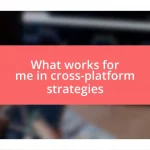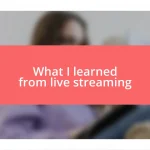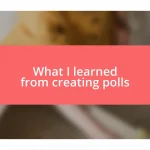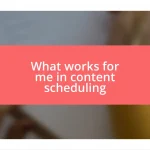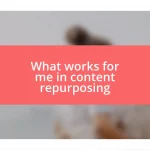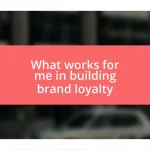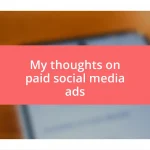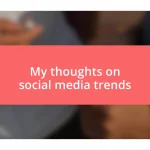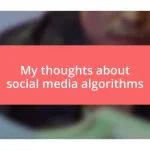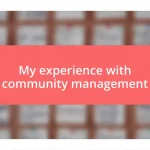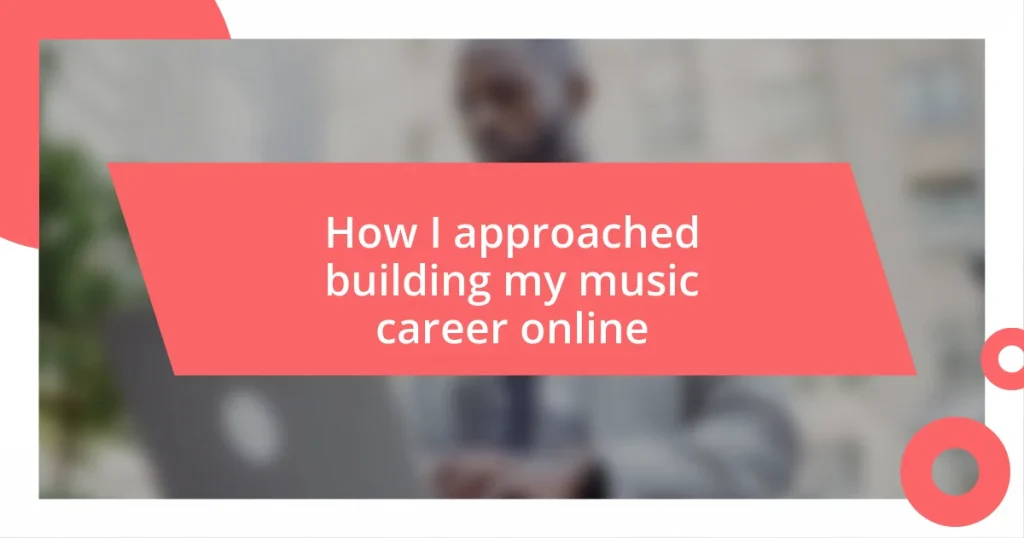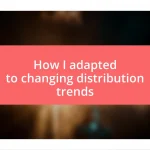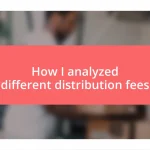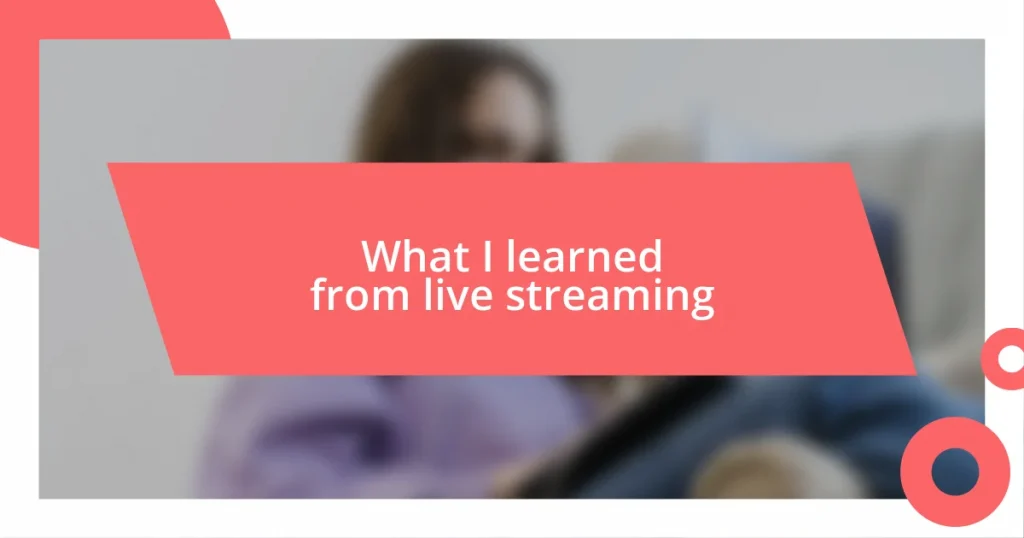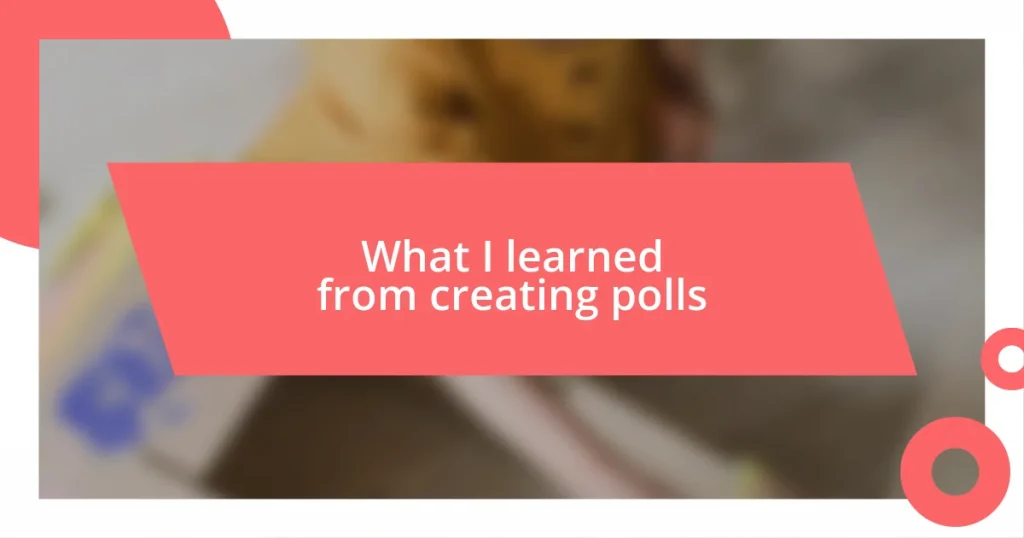Key takeaways:
- Defining clear short-term and long-term music goals is crucial for personal growth and adaptability in a changing landscape.
- Engaging directly with listeners and understanding audience demographics significantly enhances content relevance and community connection.
- Utilizing strategic promotion and collaboration can amplify reach and foster creativity, leading to deeper connections with both fans and fellow artists.
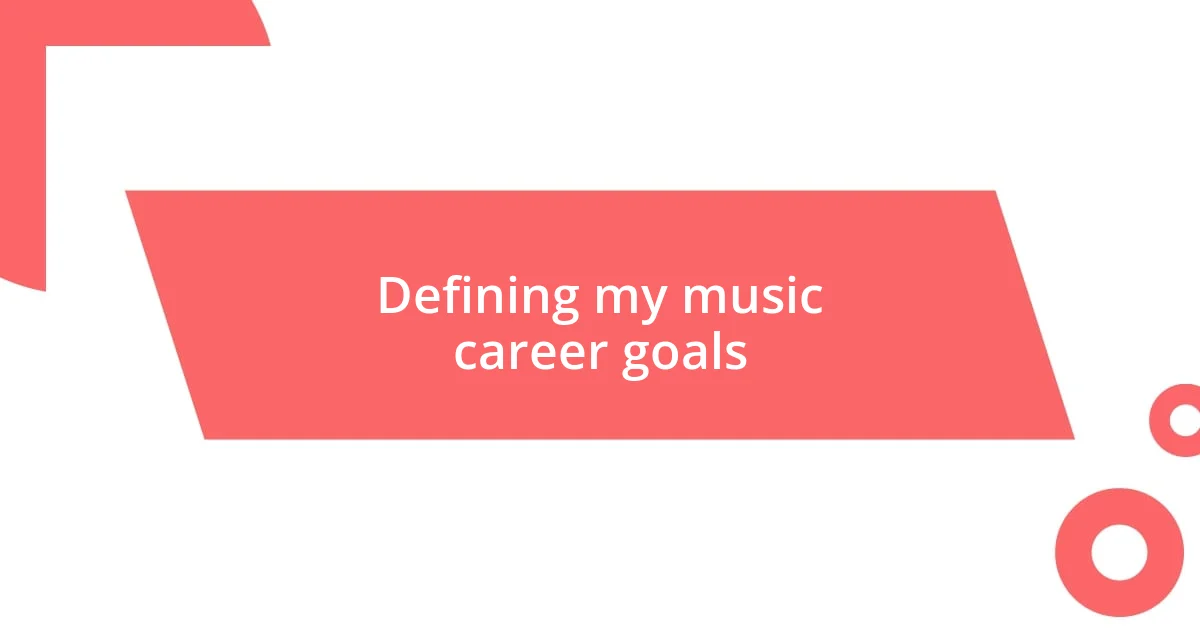
Defining my music career goals
When I began to chart my music career, I was overwhelmed by the endless possibilities. I remember sitting in my room, strumming my guitar, and asking myself—what do I truly want to achieve? Was it about getting signed to a major label, or was it simply about connecting with listeners through my sound? This reflection was crucial; it helped me understand that defining my goals required me to dig deeper into my passion.
As I mapped out my aspirations, I crafted short-term goals like writing a certain number of songs each month alongside long-term dreams, such as performing at iconic venues. I’d often find myself jotting down these goals on sticky notes and placing them around my space. There’s something motivating about seeing your dreams in written form every day, don’t you think? Those little reminders kept me focused and excited about my journey.
I also learned the importance of setting realistic and adaptable goals. When one of my songs unexpectedly gained traction online, I had to pivot quickly—revising my expectations and seizing the moment. It was exhilarating yet daunting. How often do we limit ourselves by not adjusting our aims to match new opportunities? Recognizing how my goals could evolve was vital in shaping my music path.
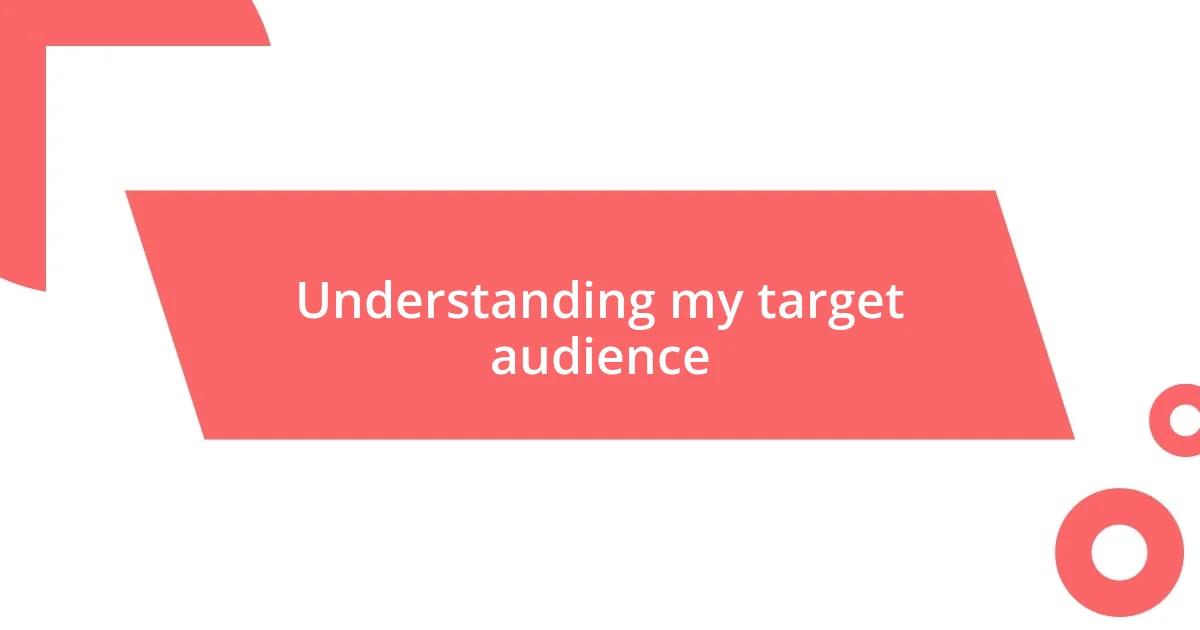
Understanding my target audience
Understanding my target audience has been transformative in my music career journey. Early on, I often felt like I was shouting into the void, releasing songs with little response. It wasn’t until I started engaging directly with listeners on social media that I realized how essential it is to know who I’m speaking to. Seeing their reactions and hearing their feedback felt like a light bulb moment. I remember a follower once commented on my song’s vulnerability, saying it resonated with their struggles. That connection was profound and helped me align my future music to reflect both my experiences and theirs.
Digging deeper, I identified specific demographics that listen to my music—age, location, and common interests. This data became a guiding compass for my content creation. For example, I discovered that many of my fans were young adults navigating life transitions. Understanding this, I started creating content around themes of growth and self-discovery. I even hosted a live Q&A session where we shared our stories. It was rewarding to see them open up about how my music had impacted their lives. These insights transformed my songwriting approach, making it more relatable and meaningful.
Creating a detailed listener persona helped crystallize my audience’s preferences. I crafted a profile based on the traits and habits of my typical fans. This included their music tastes, favorite platforms for discovery, and lifestyle. When I released my latest song, I tailored my promotion strategy by leveraging the platforms where my audience spends time. Instead of spreading myself too thin, I focused my efforts on platforms that genuinely connected with my fans. It was a game-changing realization; I could directly cater my content and outreach to those who truly matter.
| Strategy | Outcome |
|---|---|
| Engaging directly with listeners | Built a deeper connection and understanding of their needs |
| Identifying specific demographics | Aligned content with audience interests and concerns |
| Creating a detailed listener persona | Streamlined promotion efforts and enhanced engagement |
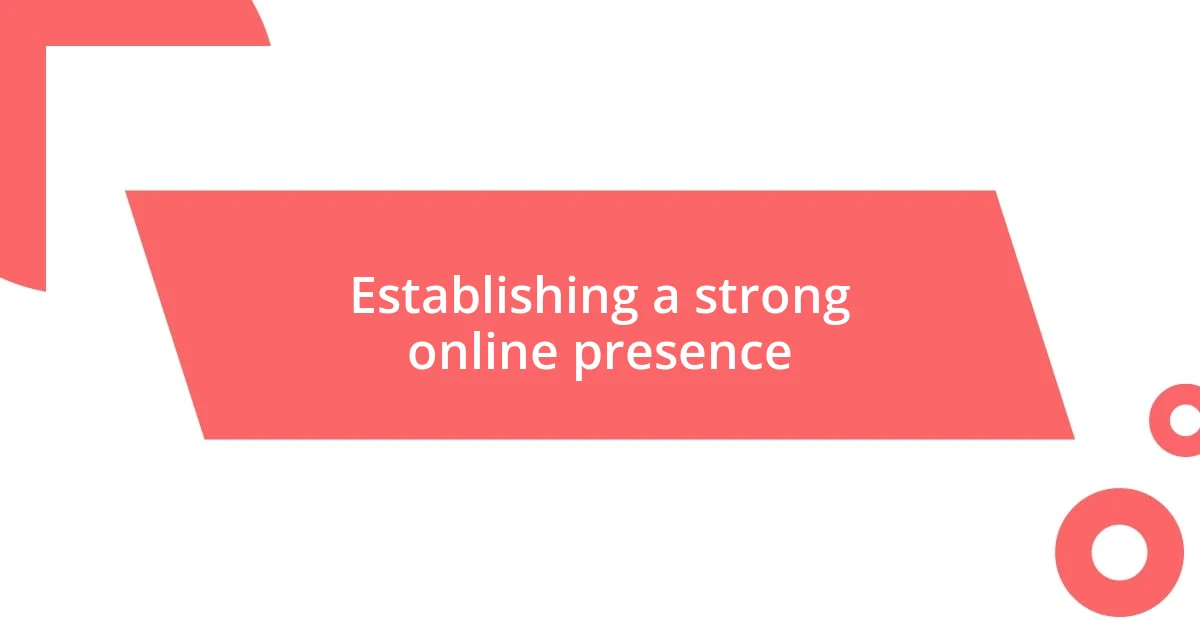
Establishing a strong online presence
Establishing a strong online presence was a turning point in my music career. In the beginning, I underestimated the power of social media and digital platforms. My first posts were awkwardly spaced and felt almost forced. But the more I shared my journey—my struggles, my wins, and even those off-key moments—the more I saw my followers grow. I recall a night when I went live on Instagram, sharing my latest song and cracking jokes in between. It felt raw and genuine, and I could see the connection forming in real-time. That spontaneity resonated with my audience and made me realize that authenticity is key.
Here are some essential strategies that helped me navigate my online presence:
- Consistency is crucial. I started posting regularly, which kept my audience engaged and eager for more.
- Visual storytelling. I infused my feeds with photos and videos that represented my music and personality—showing behind-the-scenes moments and daily life.
- Utilizing multiple platforms. Each platform serves a unique purpose; I discovered TikTok was effective for reaching younger audiences, while Instagram nurtured a more personal connection.
- Engagement over perfection. I learned to interact with my followers genuinely. Responding to comments or sharing their stories made a world of difference in building community.
- Collaborations. I reached out to fellow musicians and content creators. These partnerships not only expanded my reach but also fostered a sense of camaraderie in the creative process.
Every step I took solidified my presence, transforming it from an abstract concept into a vibrant community of supporters who celebrate my music as much as I do.
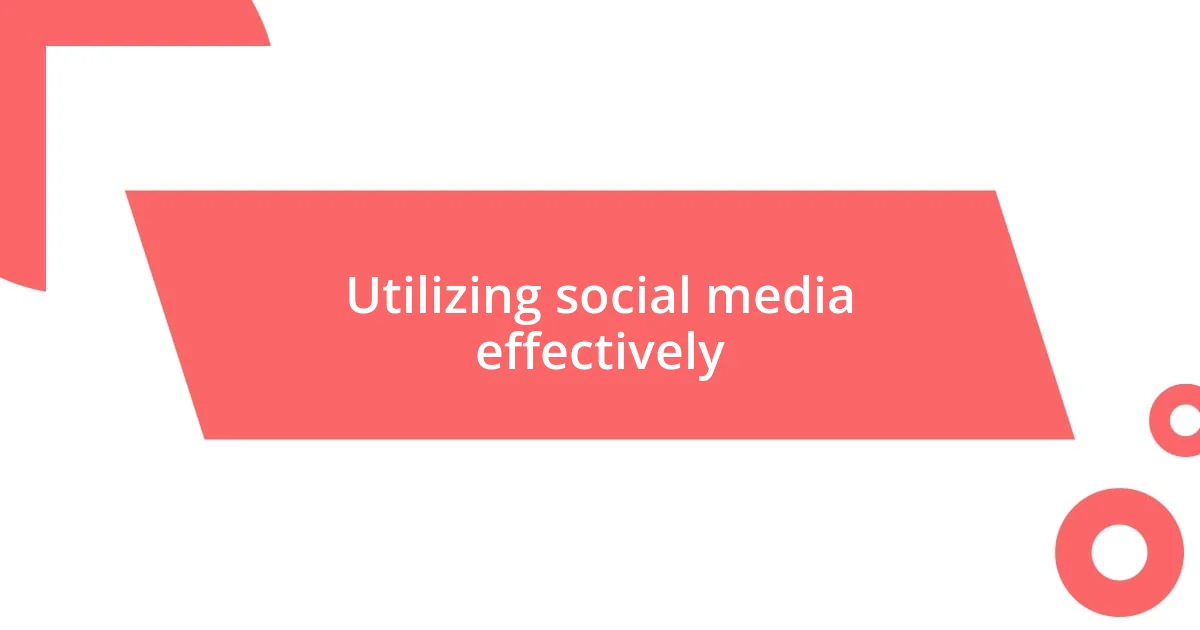
Utilizing social media effectively
Utilizing social media effectively requires more than just posting; it’s about storytelling. I remember a time when I shared an old recording of a song I almost scrapped. I paired it with a personal story about the creative struggle behind it. The response was unexpected—people resonated with my vulnerability, and comments flooded in, encouraging me to keep pushing through. In sharing that piece of my process, I felt an authentic connection form, and it reminded me how important it is to open up to my audience.
Engagement is key. I started hosting weekly “Song Analysis Saturdays” where I dove into the stories behind my tracks. It not only gave my listeners insight into my music but also opened up discussions about their interpretations. Have you ever thought about how it feels to have your audience become part of your creative journey? It’s empowering! Knowing that my fans are interested enough to share their thoughts has encouraged me to be more adventurous in my songwriting and has even led to collaborative ideas.
I also learned the importance of being responsive. Early on, I set aside time each day to reply to comments. Once, someone commented about how a specific lyric helped them through a tough time. I took the time to thank them and ask about their story. Their heartfelt response turned into a fantastic online exchange that deepened our connection. This kind of genuine interaction fosters loyalty and encourages fans to spread the word—it’s a beautiful cycle of support that enhances my music career.
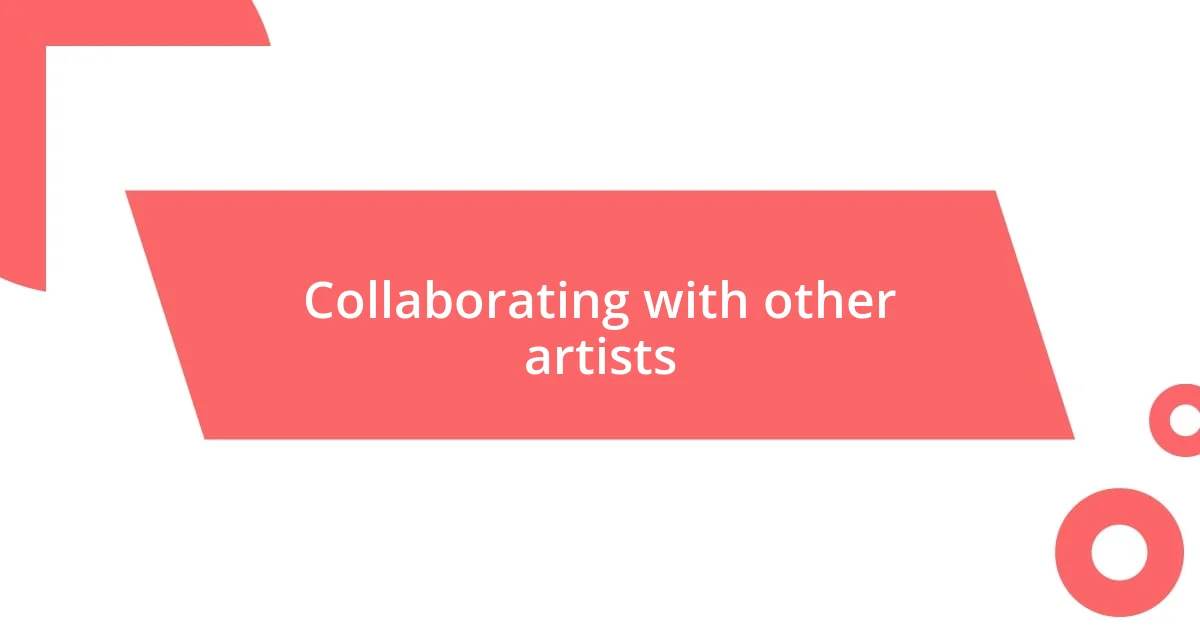
Collaborating with other artists
Collaborating with other artists has opened so many doors for me. I vividly remember reaching out to a local singer who was just starting to build her own following. We decided to create a cover together, and the energy during our practice sessions was electric! That collaboration not only introduced me to her audience but also sparked a wave of creativity that pushed me to explore different styles. Isn’t it fascinating how two distinct musical backgrounds can blend to create something fresh and exciting?
What stands out to me is how collaborations can challenge us to think outside the box. For instance, I worked with a beat maker who specialized in electronic music, a genre I hadn’t explored before. The first time we sat down together, I felt out of my comfort zone, but that’s where the magic happened. We ended up creating a track that was completely different from anything I had done previously, and it brought in a whole new demographic of listeners. Have you ever tried stepping into a new genre? It’s exhilarating!
Through these partnerships, I’ve discovered the beauty of shared experiences. Recently, I collaborated on a songwriting workshop with an established artist. We chose to share personal stories about our songwriting journeys, and it was a powerful moment. Each artist contributed a unique perspective, which not only enriched our performances but also bonded us further. Seeing how our stories intertwined made me realize that collaboration transcends just making music; it’s about connecting on a deeper level that can resonate with our audiences. Each collaboration, in my experience, is a step toward creating something greater than oneself.
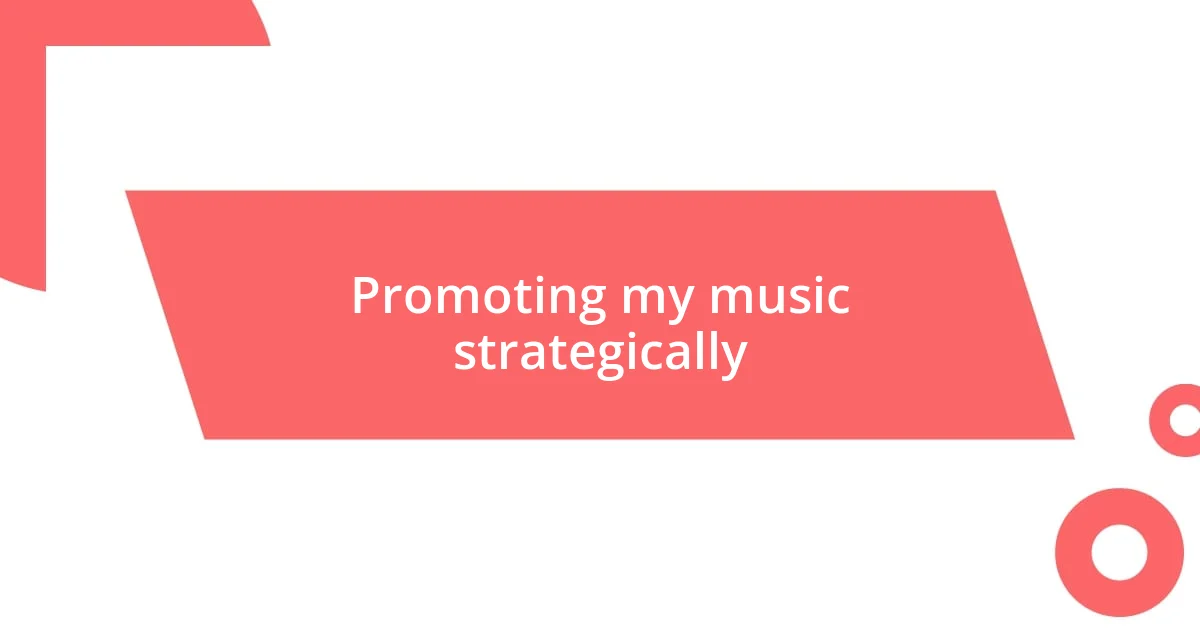
Promoting my music strategically
Promoting my music strategically has involved careful planning and creative outreach. I vividly recall launching a music video with a well-timed social media countdown. Each day leading up to the release, I shared snippets of the video, behind-the-scenes clips, and even personal insights about the creation process. The anticipation built a buzz that felt electric when the video finally dropped. Have you ever experienced that thrilling buildup before launching something significant? It’s a game changer!
I also found that leveraging platforms like Spotify and YouTube playlists was crucial. I remember reaching out to curators, sweetening my request with thoughtful notes about how my song aligned with their playlist vibe. One curator was kind enough to add my track, and that exposure doubled my streaming numbers overnight! Building relationships with these curators turned out to be more than just a numbers game; it was about creating lasting connections and crafting a community around my music. Have you considered how personal touches can make requests stand out?
Lastly, I embraced the power of email marketing. I started a monthly newsletter to share my latest updates, exclusive content, and personal insights directly with my fans. One time, I included an acoustic version of a song only accessible through the newsletter. The heartfelt responses that flooded in made me realize the value of keeping my audience engaged beyond social media noise. How often do you think about reaching your fans in a more intimate way? Those deeper connections can truly elevate your music journey.
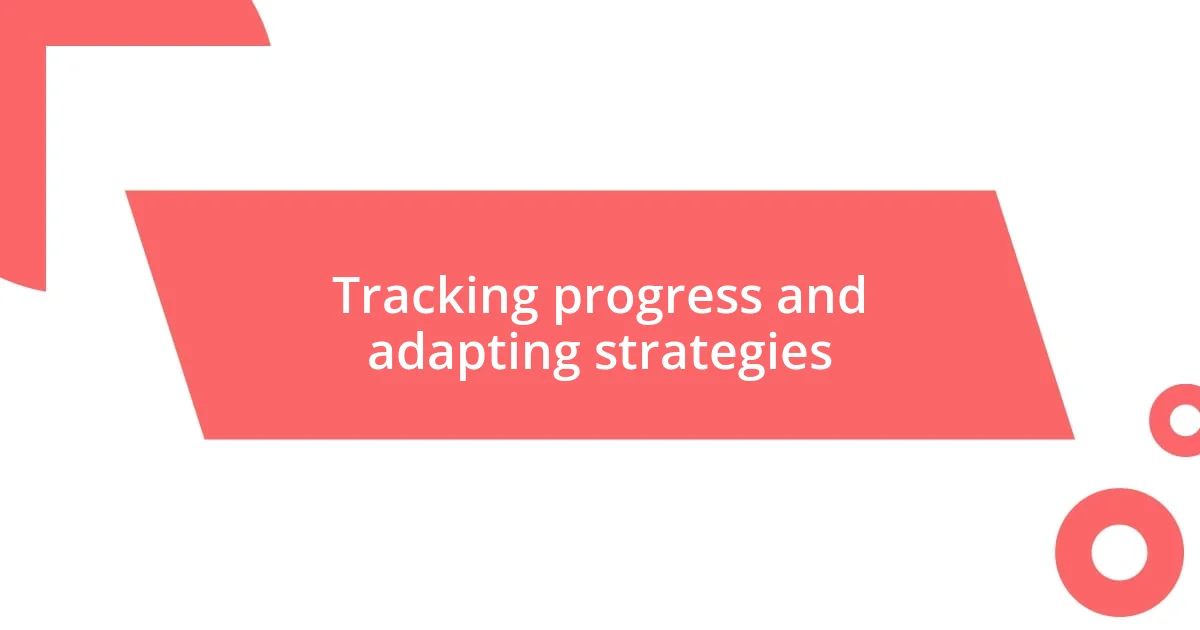
Tracking progress and adapting strategies
Tracking my progress online has been a transformative aspect of building my music career. I often take a step back and analyze the engagement metrics on my social media posts and music streams. For instance, I remember a month when a particular song gained traction. I dedicated time to understand why that track resonated so much—was it the marketing, the timing, or maybe the genre mix? Diving into these analytics has allowed me to fine-tune my approach and invest my efforts where they truly matter. Have you ever looked back to see what worked best for you?
Adapting strategies is something I’ve learned to embrace. After noticing less engagement on one of my projects, I took the chance to ask for feedback directly from my audience. I was surprised by their honesty! Some fans felt a disconnect between my previous sound and the new direction I was taking. Instead of taking that as a negative, I viewed it as invaluable input that led me to rework my upcoming songs, even inviting them into the creative process. How often do we think about involving our audience in our journey? It can make all the difference.
Reflecting on my experiences of tracking progress has not only helped me adapt but also inspired me creatively. There was a particularly challenging period when I felt like my music wasn’t evolving. Instead of succumbing to frustration, I decided to revisit my earlier works. To my surprise, that nostalgia sparked new ideas that fused with my current style. It was a beautiful reminder that growth often comes from looking back as much as it does from moving forward. Have you ever found inspiration in your past achievements? It’s a treasure trove waiting to be explored!
